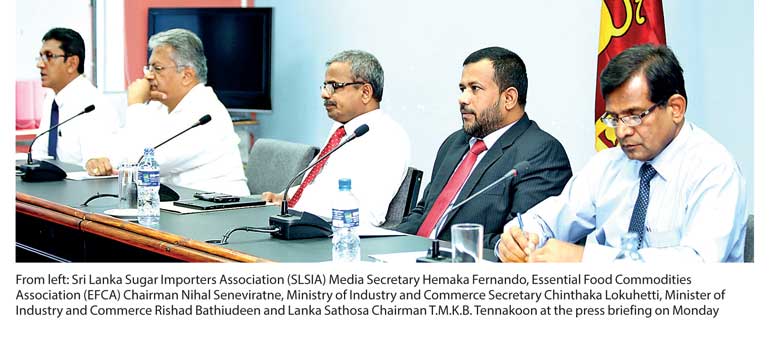Saturday Feb 28, 2026
Saturday Feb 28, 2026
Wednesday, 26 July 2017 00:05 - - {{hitsCtrl.values.hits}}

The essential food supply of Sri Lanka looks set for a tough time as the mounting struggle waged on chilling stealth narcotics deterred top food importers.
Domestic distributors who run the bulk of food supply market in the country are bracing for the worst on the supply side – even fearing for the wellbeing of their own families.
“We are highly worried, our families and our future are facing a new danger,” said an agitated All Ceylon Essential Food Items, Retail & Wholesale Suppliers Association (ACEFIR&WSA) Chairman Bandula Jayamanne on Monday, addressing a press conference at the Government Information Department on the cocaine haul netted at a warehouse of Lanka Sathosa on 19 July.
Joining the event were by the Minister of Industry and Commerce Rishad Bathiudeen, Ministry of Industry and Commerce Secretary Chinthaka Lokuhetti, Lanka Sathosa Chairman T.M.K.B. Tennakoon, Essential Food Commodities Association (EFCA) Chairman Nihal Seneviratne and Sri Lanka Sugar Importers Association (SLSIA) Media Secretary Hemaka Fernando.
“More and more containers are caught with narcotics at Colombo Port. Most of them have essential food items such as sugar. They still continue to escape detection,” said WSA Chairman Jayamanne. “There is no guarantee that one of the containers received by us will not face a situation similar to Ratmalana Sathosa container. Therefore we are highly worried; our families and our future are facing a new danger.”
Almost 99% of essential food imports for Sri Lanka’s domestic market arrive via containers shipped to seaports of Sri Lanka, with only a negligible volume coming through air freight. The 112,000 strong membership (shops, groceries and distributors in districts, towns and village levels) of the ACEFIR&WSA directly handles domestic distribution of more than 80% of such imported foods to Sri Lanka.
Jayamanne added: “We call the Government and Minister Bathiudeen to take steps to safeguard us and the local food market. Next time if a similar unchecked container is sent to one of our members and only detected when it is opened, what would be the solution? We are helpless.”
During the press briefing, sugar importers such as EFCA Chairman Seneviratne and SLSIA’s Fernando said that the next step on controlling and monitoring of containers lies with the Government.
“This is something that the Customs and law enforcement have to attend to and therefore we do not have any further comment,” said Seneviratne. “More containers from Brazil are awaiting at Colombo Port.”
Fernando said that despite the narcotics problem, Brazil is the cheapest sugar supplier to Sri Lanka. “Annually, 600,000 MT sugar is imported to Sri Lanka in 24,000 containers. Brazil supplied about 65% of total sugar imports before June 2016. Since this supply is no more, we are importing from Dubai, India, Ukraine and several European countries, paying $50 more for each MT. This is costing the Government $ 3 million extra in comparison to imports from Brazil.”
Bathiudeen said that it was not the Police, but Lanka Sathosa employees who alerted the Police.
“Our employees found that first and I praise them for their vigilance. Seven people were arrested by the Police but none of them were Lanka Sathosa employees. Even the vehicle the cocaine was brought in was a private sector container vehicle and people who were unloading were hired workers from a manpower company. The container was carrying sugar from a private sector supplier called Ranjitha Traders who qualified to supply to Lanka Sathosa. The container seal was opened in the presence of Lanka Sathosa officers, a representative of Hemas Logistics, and a representative from Ranjitha Pulses Company.
“Upon opening the container and unloading they detected the unusual green bag inside, stopped their work, opened the bag, and found the cocaine haul. They closed the container immediately and informed Sathosa Chairman Tennakoon who instructed them to contact the Police immediately. They promptly contacted the nearby Mt. Lavinia Police post. The Police who arrived identified the cargo to be a cocaine haul and took it into custody. But since the discovery, several organised groups are using the incident to tarnish my good name. I call them to refrain from doing this and also ask friends from media here to not to support such negative publicity.”
According to the Department of Commerce of Sri Lanka, various types of sugar imports from Brazil to Sri Lanka totalled $95 m in 2015 and peaked to $151 m last year. Sri Lanka’s sugar imports from Brazil this year show a huge fall – a paltry $11 m from January to May.
According to food importers who spoke on 24 July, another 65 to 70 sugar containers from Brazil are lying at Colombo Port awaiting inspection and clearance, having arrived here from Port of Santos prior to June 2016.
Sri Lanka Police said that the cocaine haul netted on 19 July at Ratmalana Sathosa is valued around Rs 3.2 b ($ 20.8 m), weighing 218 kg. Since 19 July Ministry officials have been working on a report on the incident.